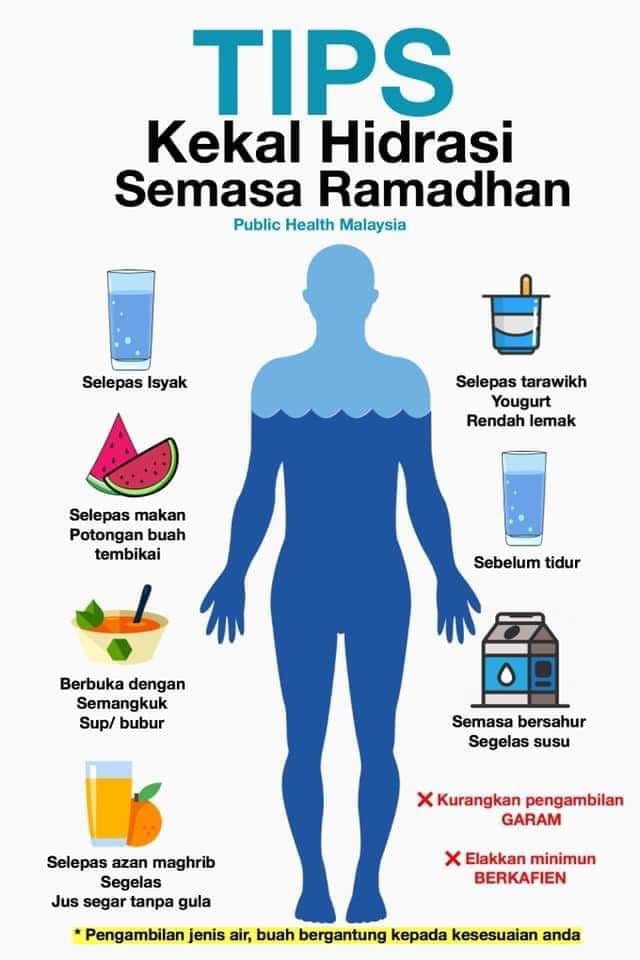Tips to eat healthily while fasting in Ramadhan
Ramadhan is the month where Muslims around the world fast from dawn to dusk. Healthy Muslims need to fast, begin with the pre-dawn meal called ‘suhoor’ and break the fast at dusk which call ‘iftar’. Apart from Ramadhan, there are many other occasions where other religions around the world are also practicing fasting. The difference is only the method and the do’s and don’ts during the ritual. Since according to World Health Organization (WHO) there is evidence suggests that fasting have positive effects on health (1), there are also people who fast in order to lose weight (E.g: Intermittent fasting) and for health purposes.
What happened to your body during fasting?
During fasting, when no food and drink is consumed, body uses its stored carbohydrate (in the liver and muscles) provide energy. Once all the calories from foods consumed have been used up, body will use the excess food that we consume in the form triglycerides (fat) to provide us with energy. This is when people usually loss weight.
Our body cannot store water so during fasting the kidneys conserve as much water as possible by reducing the amount lost in urine. However, body cannot avoid losing some water during certain process in the body such as through your skin (perspiration) and when you breathe (2).
Due to all these changes during fasting, we must to make sure that we practice healthy eating during fasting in order to make sure body that our body is able to cope with all this changing process by not losing nutrient needed but instead loss the unwanted fats, sugars, and cholesterol in the body.
4 Tips to eat healthily while fasting in Ramadhan
1.Do not skip ‘suhoor’
This is especially for special groups such as older people, adolescents, pregnant women, nursing mothers and as well as children who choose to fast. The meal for ‘suhoor’ must include vegetables, high fiber food can slow down the empty rates on the stomach and make individuals feel satiety. A serving of carbohydrates such as rice or bread (whole grain product is better) and protein – rich food such as egg or/ and dairy product are also a must.
Since ‘suhoor’ is very early in the morning and mostly people do not bother to cook for long time, thus people opt to fry their food, it is healthier to fry using air fryer where less fat (oil) is used, but apart from frying it is actually recommended to use other cooking method such as steaming or just stir fry since it use less oil.
During ‘suhoor’ also people tend to cook processed food such as sausages, nuggets etc, all these processed food actually contain high salt, it is better to avoid food that is high in salt, cause it will also makes one very thirsty later, thus food such as pickle, processed foods, salted meat and fish products, salty cheese and various types of ready-to-eat foods are best to avoid (1,2).
2. Keep hydrated
Make sure to drink 8 glass of water per day, still. Here is tip on how to drink 8 glass of water in Ramadhan according to Ministry of Health Malaysia (3).

Other than this, you can also increase water intake by consuming hydrating food. Try to add hydrating food such as watermelon, cucumber, tomato and green salad. You must also avoid caffeinated beverages such as coffee, tea and cola, because caffeinated beverages are diuretic (which means it makes one urinate more often when consumed) this will lead to dehydration as well. Soupy food also rich in water thus it is suggested to consume this kind of food when break the fast. During the day of the fasting period, when the temperature is high (E.g: noon) it is important to remain in a cool and shaded place and to avoid the sun (1,2).

3. Break the fast gently
When it is time for break the fast, avoid filling up on greasy foods in the form of cakes and deep-fried savory snacks. It is best to go for dates, fruit or nuts to satisfy your hunger. If you often get caught in the rush hour traffic, consider keeping these preferred choices handy in small containers in your handbag or backpack so you do not have to delay your breaking of fast. This will prevent you from getting overly famished at dinner after the prayers, where you risk overeating and causing indigestion (4).
In Islam also, it is a sunnah habit to consume dates when break the fast;
You may also try to consume date and water to break fast and perform maghrib prayer first, then only begin to eat heavy meals, just as the suggestion from Ministry of Health Malaysia.

4. Moderation and variation
The changes to eating habits and lack of fluids during the day may cause constipation for some people. When you can eat and drink, consume plenty of high fiber foods, such as wholegrains, high fiber cereals, bran, fruit and vegetables, beans, lentils, dried fruit and nuts alongside plenty of fluids will help to ease constipation. Do some light physical activity, such as going for a walk after iftar or right before iftar in the evening will also helps with the constipation and indigestion after iftar.
While Ramadhan is time for people to reunite however during the pandemic of COVID19 it is best for people to not make a celebratory feast together. Iftar meals are often a time for celebration (of the day that you have successfully refrain yourself from eating and drinking) but it is still important not to go overboard when eating during Ramadan. Consuming a lot of deep fried, creamy and sweet foods may cause you to gain weight during Ramadan. Ramadan can be a good time to make changes to improve the balance of your diet that you can sustain in the longer term.
Be moderate in preparing ‘iftar’ and ‘suhoor’ menu. Moderation is the key when you go for grocery shopping as well. You can also practice ‘suku – suku separuh’ during ‘suhoor’ and ‘iftar’.

References
1. World Health Organization (WHO) (2020). Dietary Recommendation for the month of Ramadhan. http://www.emro.who.int/nutrition/nutrition-infocus/dietary-recommendations-for-the-month-of-ramadan.html (Accessed May 8, 2020)
2. British Nutrition Foundation (n.d). A healthy Ramadhan. https://www.nutrition.org.uk/healthyliving/seasons/ramadan.html?__cf_chl_jschl_tk__=75c06dff67f5c87204c0dc2cdd8343844c35c78f-1588901425-0-ATZP71yUnOxiGwGcgpUyrLmtTJ-b_aVnqESs0dUhbMEwJx2CMSYck_sO8RxelwmxumL_jHJv2_mGOGvWSHlXaS_XwkdLczerYyCCTS6sjsdD9iRqqIt7I_CiM5BqvX8mnxfvPxXSNRGVErKJz0u9Z-jdTIY4PV0TvLNPbbPWNeZ0FpQCI0OKjcEl-s-fgzbwiWzuJ6jfRtpYYwc37XdkKv5wE3APFD-rODoj4wdkXGHByASPcLGaYNiPWa_9x1AS7n4g0TY5EsWp3OHEeCmtpv3c4VZ3rn5QKzrtx788z_k0_J4rluYZx1CbGz3DcFaQIdFXGyIZAPcr2CYlI1MMnmlD-genvQspQrMxHnrOn6Ix2p7QlmZSgD0RKHKOIeG80w (Accessed May 8, 2020)
3. Kementerian Kesihatan Malaysia (KKM). Jabatan Kesihatan Negeri Pulau Pinang. https://web.facebook.com/jknpenang/posts/3729048157168283?_rdc=1&_rdr (Accessed May 8, 2020).
4. Indra Balaratnam (2018). New Straits Times (NST). Eat Well Healthy Eating for Ramadhan. https://www.nst.com.my/lifestyle/heal/2018/05/367119/eat-well-healthy-eating-tips-ramadan (Accessed May 8, 2020).




